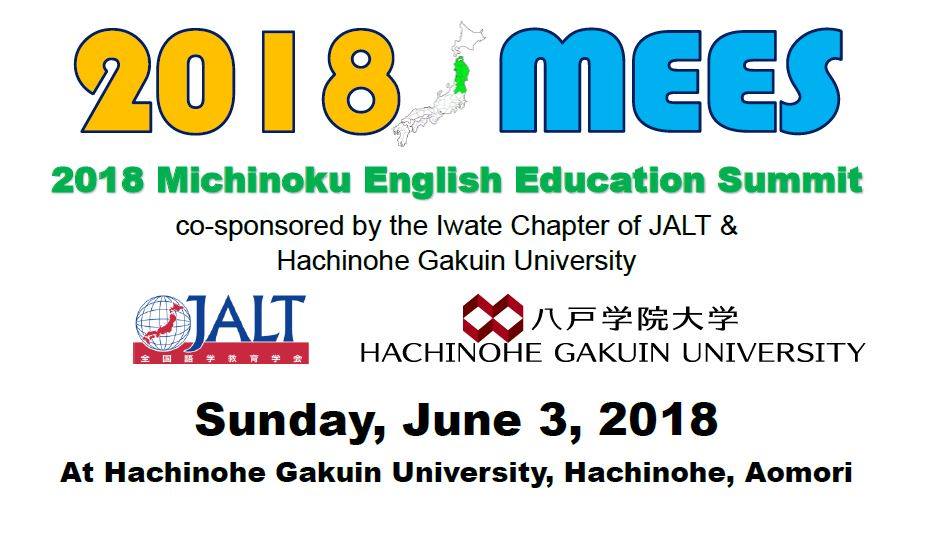Here is a selection of photos from the fifth annual Michinoku English Education Summit in Hachinohe. Thanks for coming out again everyone! We’ll see you all next year!
All Photography ©2018 Jason Hill
Here is a selection of photos from the fifth annual Michinoku English Education Summit in Hachinohe. Thanks for coming out again everyone! We’ll see you all next year!
All Photography ©2018 Jason Hill
Date and TIme: Sunday, April 22, 2018 – 1:30pm to 4:30pm
Location: AIINA in Morioka Rm 813 – View Map
Abstract:
This is a period of enormous change in Japanese primary education, as English advances to become a subject for the upper grades and a compulsory activity for the middle grades from 2020. After working on the MEXT committee which developed the materials; “We Can!” and ”Let’s Try!” in this presentation I will share my ideas about how they should be ideally used in the classroom this year and next. I will also provide feedback on the new curriculum from student teachers who are trying it out in university classes and from children at pilot schools already using the materials.
Bio:
B.Ed (Hons), M.A. in TEYL, (Teaching English to Young Learners).
Alison is from the UK and trained as a primary school teacher, before coming to Japan on the JET programme in 1989. She has over 20 years of experience teaching in kindergartens, primary schools and junior high schools in the coastal area of Fukushima and worked for a year as the only native teacher in the 16 primary schools in Minamisoma City, Fukushima, directly after the earthquake, Tsunami and nuclear disaster of 2011.
Since 2012, she has been as a Specially Appointed Associate Professor at Miyagi University of Education. She teaches English communication, writing and practical teaching skills to undergraduates who will become primary and secondary school teachers of English. Her areas of research are children’s opinions on reflective learning activities, active learning methods for Japanese primary English classrooms and the effect of storytelling as a gateway to English learning. She is involved in in-service teacher training at the university and works as an adviser in primary English education to numerous public schools the Tohoku area.
Alison has worked for over ten years with various publishing companies, including Kairyudo and Kumon, on the development of materials for young learners in both public primary and junior high schools, and private language schools. She was appointed as an English curriculum and materials development adviser to the Myanmar Government, helped develop two texbooks and visited Myanmar three times from 2016-2017. She was also appointed as an English curriculum and materials development advisor for MEXT from Dec. 2016 – Dec. 2017, working on the syllabus reform and development of the materials; “Let’s Try!” and “We Can!” to be used from April 2018 until the new English primary school curriculum officially begins in 2020.
She is programs chair for Sendai JALT and enjoys travelling, art, watching movies and yoga in her spare time.

We are excited to announce Gregory Sholdt of Kobe University as our 2018 MEES plenary speaker!
よろしくお願いします!
Plenary Title:
Exploring Avenues of Insight into Our Classrooms: Let’s Take a Look at the Numbers
Summary:
Making adjustments based on informal observations of teaching and learning is second nature for most experienced, reflective language teachers. Yet, engaging in more systematic cycles of observation and change through action research can guide teachers to more refined and deeper understandings of their craft and significant improvements in their classrooms. Action research also provides an entry to academic discourse on language teaching and learning when teachers share their findings through conference presentations and published manuscripts. The goal of this talk is to explore these professional benefits for language teachers and to introduce an approach to doing action research that fosters knowledge and skills necessary for more traditional research studies, particularly those involving quantitative methods. The presenter will review standard action research methods and describe how to adjust them to emphasize the collection and analysis of quantitative classroom data. He will introduce some fundamental topics in quantitative methods including basic measurement theory and interpretation of descriptive statistics in order to demonstrate the benefits and limitations of working with numbers in action research. Resources outlining specific types of quantitative data readily available in classrooms and techniques for basic data analysis will be provided. During this relaxed, fun, and interactive talk, participants will have opportunities to share about their own research endeavors, get first hand experience with the fascinating world of statistical analysis, and consider ways to incorporate quantitative data in their own action research projects.
Greg’s Bio:
Gregory Sholdt teaches in the School of Languages and Communication at Kobe University. His interests include professional development, classroom-based research methods, English for academic purposes, and fluency instruction. Based on his graduate studies in Educational Psychology and experience teaching introductory statistics courses at the University of Hawaii, he has been exploring innovative approaches to professional development for teachers through classroom-based research. He has been encouraging, guiding, and supporting language teachers in Japan as they work towards building knowledge and gaining skills fundamental to conducting classroom-based quantitative research. Along with presentations, workshops, and online instruction, he has planned and executed large-scale, yearlong projects that center on collaborative professional development through shared research experience and have involved nearly one hundred language teachers across the country. He currently serves as a Consulting Editor for the JALT Journal and the Chair of the JALT Research Grants Committee.